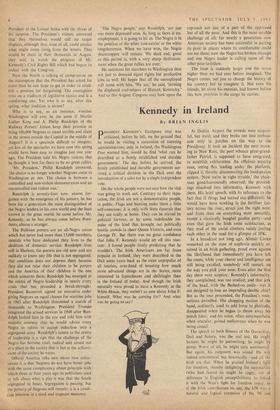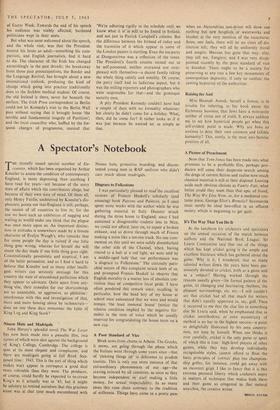Kennedy in Ireland
By BRIAN INGLIS
pRESIDENT KENNEDY'S European tour was criticised, before he left, on the ground that he would be visiting a succession of tottering administrations; only in Ireland, the Washington Post warned him, would he find 'what can be described as a firmly established and durable government.' The day before he arrived, the firmly established and durable government sur- vived a critical division in the Dail over the introduction of a sales tax by a single independent vote.
On the whole.people were not sure how the visit was going to work out. Contrary to their repu- tation, the Irish are not a demonstrative people, in public. Flags and bunting make them a little self-conscious; it is only with State funerals that they are really at home. They can be stirred by political fervour, or by some indefinable im- pulse of the kind that brought out politically hostile crowds to cheer Queen Victoria, and even George 1V. But there was no great confidence that John F. Kennedy would set off this reac- tion: 1 found people freely predicting that he wouldn't. The Irish Americans are far from popular in Ireland; they were described in the Dail some years back as the most unpopular of all tourists, over-fond of boasting how much more advanced things are in the States, more interested in leprechauns and shillelaghs than in the Ireland of today. And though the Irish naturally were proud to have a Kennedy at the White House, they weren't so sure about John F. himself. What was he coming for? And what was he going to say? At Dublin Airport the crowds were respect- ful, but staid; and they broke out into enthusi- asm only in patches on the way to the Presidency. It took an incident the next morn- ing at New Ross, the port whence great-grand- father Patrick is supposed to have emigrated; to establish exhilaration. An officious security man, seeing flex leading under the platform, clipped it, thereby disconnecting the loudspeaker system. 'Now we're in right trouble,' the chair- man good-humouredly observed; the proceed- ings dissolved into informality, Kennedy with them. His brief speech, with its reference to the fact that if things had turned out -differently' he would, have been working in the fertiliser fac- tory across the river, struck just the right. note; and .from then on everything went smoothly, except a classically bungled garden party—and even that gave the Irish some satisfaction, as they read of the social climbers vainly jostling each other in the mud for a glimpse of jFK.
In a broadcast not long ago, Alistair Cooke remarked on the state of euphoria quickly at- tained in an Irish gathering, proof even against the likelihood that immediately you have left the room, while your charm and intelligence are still being extolled, somebody will remark on the way you pick your nose. Even after the first day there were sceptics: Kennedy's informality, they complained; was too studied; and that jerk of the head, v, ith the flashed-on smile—was it not designed to lose an impending double chin? But as the tour proceeded, the President's man- nerisms dwindled. The chopping motion of the hand, ordinarily used to add force to platitude, disappeared when he began to throw away his punch lines: and his voice, often unsympathetic when oracular, gained mellowness when he was being casual.
The speech to both Houses a the Oireahtas, Dail and Senate, was the real test. He might lecture; he might be patronising; he might be prosy. Worst of all, he might turn sentimetthil. But again, his judgment was sound. He ■Na:S indeed sentimental, but historically-- and all tlien Irish are that. When he praised Ireland's figlit for freedom, thereby delighting the nationalis'ts' (who had feared he might be cagey, out of deference to English susceptibilities), he linked it with the West's fight for freedom toda■ ,as if the Irish contribution to, say, the UN 'a .a natural and logical extension of the '98 and of Easter Week. Towards the end of his speech his audience was visibly affected; hardened politicians wept in their seats.
But what was most welcomed about the speech, and the whole visit, was that the President treated his hosts as adult—something his com- patriots, and English journalists, find it hard to do. The character of the Irish has changed astonishingly in the past decade; the breakaway from those past preoccupations, the Border and the Language Revival, has brought about a new international outlook, producing the kind of change which going into practice traditionally does to the feckless medical student. Of course, the old Ireland is there, never far beneath the surface. The Irish Press correspondent in Berlin could not let Kennedy's visit to the Berlin Wall pass without saying that it brought home 'the terrible and fundamental tragedy of Partition'; and the local councillor who, baffled by the fre- quent changes of programme, insisted that 'We're adhering rigidly to the schedule until we know what it is' is still to be found in Ireland, and not just in Patrick Campbell's column. But the difference between the Ireland of today and the travesties of it which appear in some of the London papers is startling. Even the tea-party at Dunganstown was a reflection of the times. The President's fourth cousins turned out to be self-possessed, neither overawed nor over- pleased with themselves—a decent family taking the whole thing calmly and sensibly. Of course, the party itself had its ludicrous aspect, but it was the milling reporters and photographers who were responsible for that—and the grotesque security men.
A pity President Kennedy couldn't have had a couple of days with no formality whatever; but clearly he didn't come for a holiday. What, then, did he come for? It rather looks as if it was just because he wanted to; as simple as that.







































 Previous page
Previous page